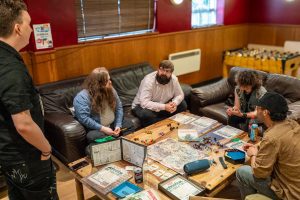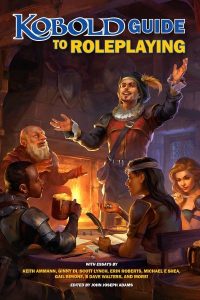
A community project has started in Cornwall, UK, offering low-cost Dungeons and Dragons (D&D) games to improve mental health and well being.
Alex Delaney, a professional game designer from Cornwall, runs D&D games on a voluntary basis in response to the mental health crisis in the county. Delaney said, “I’m excited to be running these low-cost games to benefit the community. At the first session, one of my players told me his anxiety was really bad from the stress of moving house, but by the end of the session he was feeling more optimistic and relaxed.”
Delaney sees a number of social benefits from playing D&D, such as reducing depression and loneliness. The first game for adults started recently in Truro at Truro Methodist Church and runs monthly. Further events are planned throughout the summer.
Online games will start shortly and Cornwall D&D hopes to expand running low-cost games to other locations in the county through grant funding and donations.
“When I was playing D&D while shielding during the pandemic, the social connections I was able to make online stopped me feeling so alone and helped me unplug from my anxieties,” said Delaney. “I wanted to bring these mental health benefits to more people, especially in-person, after the lockdowns.”
Benefits of Play

After seeing the benefits that D&D can bring first-hand, Delaney is studying counselling with Adult Education Cornwall to be able to support people through the game and is about to start a course with US-based company, Geek Therapeutics, who integrate geek culture into therapeutic practice.
Since shielding and lockdowns ended, Delaney says D&D continues to be a lifeline for many. For some, it’s the only time they leave the house and meet other people all week. For others, it’s the one thing they look forward to. It gives them resilience to cope with work and other life challenges.
“One player told me that he was on the phone to the Samaritans [a UK-based suicide prevention hotline] that morning and they reminded him he had D&D that evening. They encouraged him to go along. He went from feeling severely depressed to looking forward to the next session after the game. It’s amazing to be able to support people in this way through simple interventions like storytelling.”
Finding a Game
But it can be difficult to find a game. “Players in Cornwall face a choice,” Delaney said, “between gaming club sessions which can be canceled at the last minute or are overbooked, or paying for premium games (often online) for a more reliable group and GM.
“This means the people who would benefit from playing D&D either cannot access or afford a game. My community project aims to bring the security of premium games at a lower cost (just covering venue hire and my travel costs) to people experiencing mental health challenges.”
Gaming Companies Lend Support

Although he uses “D&D” as a shorthand for most tabletop roleplaying games, Delaney uses a variety of games and systems. Game companies, including Kobold Press, have been keen to provide support by gifting items like game systems or gaming supplies.
With the aid of Kobold Press, Delaney can provide game play options for players using popular books such as Deep Magic, Tome of Heroes, and the ENNIE nominated Kobold Guide to Roleplaying.
Delaney said, “When running games to improve mental health, it’s important for me, as a therapeutic game master, to be fully immersed in what’s happening, how players are reacting, and how they are feeling. This means I need to not be thinking about game mechanics in the session. Kobold’s books enable me to prepare better before a session and have a unique range of game options available for players to pick from.
“The Deep Magic and Tome of Heroes books support players’ ideas (even some of their more wild ideas) and bring their characters to life. It has also allowed me to challenge players’ expectations of characters—like are zombies and gnolls always evil?
“When using games to improve mental health in seasoned D&D players, it’s important to keep these players thinking creatively and immersed in the game, rather than in their head, by flipping their perceptions of what they think a character should do or be. It also helps put them on an even footing with newer players, allowing them to bond as they learn and find the fun side of things.”
Alex Delaney is available to interview or to provide more information on this story by emailing thatgothgm@gmail.com.

wow this is so awesome!! this kind of thing brings us closer together as a community. huzzah to delaney and to kp!!!
I’m a war veteran here in Appalachia, USA reading this article with much gratitude. I had heard of Kobold Press but just never crossed it in my paths. Now that I know they publish guides for tabletop role-playing, I will see about getting this kind of theraputic tool started at Veterans Affairs facilities and the like. Thank you for *your service to the mind and the imagination and creativity, Kobold Press.